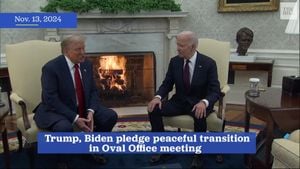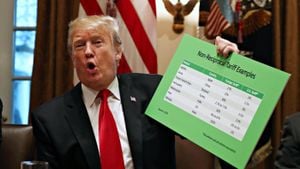Britain's political scene has recently witnessed notable developments, particularly surrounding the UK Conservative Party's leadership and its approaching challenges around defense spending. With the Labour Party taking power and promising to restore the nation's military strength, the Conservative Party faces scrutiny over its commitment to defense budgets amid financial constraints and critiques of its previous strategies.
The UK Ministry of Defence (MoD), based under the Conservative regime, is grappling with significant financial pressures, compelling the government to instruct the procurement branch at Abbey Wood, Bristol, to tighten its weapons and arms orders through the remaining financial year. This initiative directly contradicts Labour's ambitious defense spending ambitions, which include upping military expenditure to 2.5% of the GDP—a commitment now suggested to be postponed until as late as 2034.
Critics argue this may represent a significant shift away from the Conservatives' long-standing defense policies and could hinder the UK’s military capabilities. By reducing immediate defense spending, the country risks being ill-prepared to confront burgeoning global threats, especially those arising from tensions across Eastern Europe and increasingly sophisticated cyber threats.
Previously, during the term of former Prime Minister Rishi Sunak, the Conservative Party lost the most seats it has ever faced, leading to discussions about the direction of the party itself. The recent selection of Kemi Badenoch as the new leader is seen as the Conservative's attempt to reclaim its image and stabilize the party's future. Badenoch’s leadership campaign focused on tightening governmental spending and addressing identity politics, which she insists have distracted the Conservatives from more pressing national concerns like public safety and trust.
Despite winning the leadership by defeating Robert Jenrick by over 12,000 votes, Badenoch's appointment has cast doubts on the party’s ability to unite its factions. She is now charged with preparing the Conservative Party not just for the next election but for addressing the criticisms of former administrations, where it struggled to maintain public trust amid economic challenges and rising crime rates.
"We need to be honest about the fact we made mistakes, and we need to get back on track," Badenoch emphasized after her victory, reminding her party of the need for accountability, especially with the Labour Party hell-bent on painting the Conservatives as detrimental to the nation’s security.
With her leadership, Badenoch hopes to reintroduce pivotal Conservative values like self-reliance and personal responsibility, which she believes need to permeate the party's policies moving forward. A notable aspect of her style is drawing on historical comparisons with former Prime Minister Margaret Thatcher, highlighting both her commitment to free markets and her tough stance on government spending.
This rightward turn within the party, following its dismal electoral performance, has resulted not only from internal challenges but also from the external pressures of public opinion on defense. The UK populace has displayed growing support for increased military spending, especially against the backdrop of international conflicts and perceived threats to national security.
Modern warfare’s reliance on advanced technological capabilities—like cybersecurity advancements, AI, and sophisticated armed vehicles—underpins the need for progressive funding. With the UK facing potential cuts, defense analysts express concerns about the long-term consequences of this reduction, particularly as allies like the United States ramp up their military expenditures.
The political consequences of failing to deliver on defense commitments could be significant. Labour's proposal to increase defense budgets has garnered public support, creating urgency for the Conservatives to not only counteract the narratives proposed by Labour but to formulate their cohesive identity as leaders capable of addressing national security issues.
Alongside these internal party dynamics, the Mixed Combat Air Program, featuring collaborative efforts with Japan and Italy, is under intense scrutiny. This project, integral to Britain's defense strategy for advanced fighter jets set for deployment by 2035, faces uncertainty about funding and its future direction amid financial constraints.
Both Japan and Italy are positioning this endeavor as not only militarily beneficial but as opportunities for job creation back home, which aligns neatly with Badenoch's aim to showcase the Conservative Party's commitment to prosperity through defense projects.
Despite this, challenges remain as Badenoch and her government must navigate complex political landscapes, where public sentiment is primarily directed toward accountability over military spending. Polls increasingly indicate strong public desire for perceived stability and safety, amplifying scrutiny over the Conservative Party’s posture on defense and broader social issues.
Final thought, with labor equity at the forefront of many discussions, Badenoch's rise symbolizes much more than just a change at the top of the Conservative Party—it could well dictate the political climate and military readiness of the United Kingdom for years to come.



